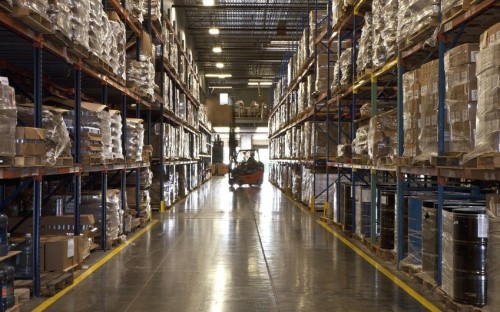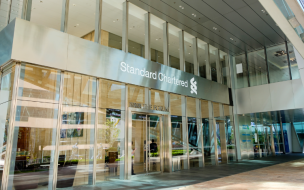Supply chains are longer, more dynamic and carry greater risk. Their complex and fast-changing nature have led to greater need of management.
International supply chains are here to stay. Globalisation means supply chains are longer, more dynamic and carry greater risk today than ever before.In many industries much capital is invested in stock held in warehouses – supply chain management is key to unlocking effective distribution and performance.
The difficulty in managing complex and fast-changing supply chains has led to greater need for talent, from logistics providers such as UPS to large manufacturing companies and consumer goods groups like Unilever and Airbus.
“There is a hunger – a hunt for talent,” says Kasra Ferdows, a professor of global manufacturing at Georgetown McDonough Business School in the US.
Companies have never been more reliant on their suppliers. They are working with multiple partners, many of whom have hundreds more partners themselves, in ordering materials, managing stock levels and organising delivery to consumers.
The increasingly cross functional and global nature of supply chains means companies in virtually every sector are in need of innovation of their logistics.
There is also opportunity in management consultancy firms including McKinsey & Company and BCG that service these areas, known as operations practice or performance improvement.
These companies see business schools as steady streams of talent – but many of them have let supply chain management “slip through the cracks”, according to Kasra.
There is a lack of faculty with experience in supply chains and professors tend to teach comfortable subjects – finance, marketing and strategy, he says. “All of these [functions] are integral to supply chains." But their cross functional nature means they cannot be looked at in insolation. “We have the responsibility to teach the subject for what it is,” he adds.
Cross-functionality means collaboration is key. Communication with suppliers, logistics companies and retailers has in the past been traced via a messy stream of emails and phone calls. But technological innovation is changing chains’ structure.
Technology – cloud computing, automation software and open-source electronics – has increasingly been called upon to help the complex needs of supply chains.
“It should have dramatic improvement affects,” says Arnold Maltz, associate professor at the supply chain department at Arizona’s W.P Carey School of Business.
Cloud-based collaboration allows companies to track orders in real time and identify where there are problems.
Companies are also experimenting with software to increase efficiency. This includes software that calculates packages’ dimensions to ensure empty parcels are not sent.
“We’re starting to automate warehouses. When that happens, accuracy goes up [and] processes become more stable. A lot of things get better,” Arnold says.
Like at many other business schools, this is reflected in his department’s teaching. Supply chain managers must have a firm grasp of technological advances.
W.P Carey is one of a handful of business schools to offer a specialist master’s in global logistics, as well as a certificate program in supply chain management.
Other areas of innovation include the adoption of big data. Companies are using modelling tools to simulate distribution networks, based on previous sales data. The use of analytics allows supply chain management to minimise stock levels.
“Data is a strong base that allows for better scheduling and logistical process throughout the supply chain,” says Eugene Spiegle, vice chair of the supply chain management department at Rutgers Business School, based in the US.
Growing scrutiny of supply chains, in light of headlines including horse meat found in frozen beef products in Europe and discount retailer Target’s botched expansion into Canada, mean companies in all sectors are making logistics a focus area.
“Not only have supply chains become a focus but, in many companies, they have become a department with senior level management,” says Eugene.
Companies including General Dynamics, the aerospace group, and Target, both based in America, have hired from specialist supply chain management programs.
SAP, the software solutions company, has added more than 250 business schools to its University Alliances program, providing students with training in logistics technology.
“We still need some very talented people to run these things [and] to manage large groups of people,” says Arnold at W.P Carey.
Companies are targeting experienced hires to strengthen supply chains – often MBAs. Amazon, for instance, recruited the largest number of MBA students at a number of top business schools last year.
“In a reflection of the changes that technology is bringing to retail, the jobs for MBAs [in e-commerce] are now in areas such as logistics,” says Conrad Chua, head of MBA careers at Cambridge Judge Business School in the UK.
This tech includes supply chains' digitisation. Consumer expenditure online continues to rise each year. One of the key factors that influence online shopping behaviour is delivery times.
Speed is of the essence. This has prompted tech groups to consider innovative delivery methods, including Amazon’s testing of drone deliveries.
Consultancy Transport Intelligence forecasts the delivery market will grow by nearly 10% a year until 2017. The e-commerce delivery business is already worth €172 billion, according to the consultancy.
As such, there has been an increase in supply chain opportunities at INSEAD, the global business school, says Zeynep Flouret, assistant director of corporate partnership development.
“We see many large businesses demanding talent for SCM [supply chain management] roles, as well as tech companies and large NGOs,” she says, adding that logistics providers including DHL and software companies are particularly active.
As supply chain efficiency becomes a significant issue, a widening pool of organizations are hiring strongly, according to Sara Williams, MSc careers relationship manager at Cass Business School. “I have seen an increase in demand,” she says.
This includes oil and gas majors such as BP and Shell, and large pharmaceutical companies.
“[Companies] need the right staff to effectively plan and predict, in order to ensure their supply chain is lean and cost effective,” Sara says. She adds that recruiters are looking for organisational skills and significant commercial acumen in new hires.
Employers will also value strong analytical and quantitative skills, and good interpersonal and communication skills, says Chris Higgins, assistant director at INSEAD’s Career Development Centre.
This includes the ability to perform in multifunctional and multicultural teams, he adds. For supply chain management it is increasingly a matter of supply and demand.
Student Reviews
Best Journalism school in Europe
When I first stepped onto the campus of City, University of London, I knew I was in for a ride - and not just on the Tube! With its vibrant energy and an impressive repertoire of programs, City U became my home away from home.
The Journalism program was kind of a big deal. Rumour was that we were the best in Europe!
The lecturers were not just experts in their field; they’re practically journalistic royalty. They were invested, passionate, and had a knack for turning the most flat press release into a riveting news story. With their guidance, I’ve learned to navigate the chaotic world of media like a pro.
The campus was a melting pot of every culture, being that we had such a diverse international crowd.
Being in the heart of London, I had the world at my fingertips - there was always a new corner to explore, a hidden gem of a cafe to discover, or a street performer!
City, University of London wasn't just a university; it was a chapter in my life story that I’ll never forget.
Learning environment
The teacher-learner ration is manageable, giving each learner a chance to gain personal attention. It is also easier following up on the progress of a student, as the numbers per class is not large. the conducive environment for learning includes clean classes, standard desks, world class instructional facilities and the opportunity to engage lecturers even after their sessions. The team spirit at City is above board, with learners getting chance to learn both from instructors and colleagues. This is the university of choice; the place to be.
Classes
I liked that each class had a manageable number of learners, making the professor-learner ratio favor knowledge acquisition. I also liked that study schedules were manageable, and not overwhelming. The focus on talents and gifts even within the learning environment makes it possible for learners to achieve the best of their potential, and this has worked to the advantage of those that have schooled at City, University of London
Classes
The diversity at City University facilitates interactions and is a direction toward the unity of the world. The classes are well built to match the number and needs of all students regardless of the elements of diversity that set people apart. The use of technology in delivery makes learning even more interesting and achievable. At City University there is no distinction pegged on the issues that make people unique.
professors
The team of lecturers at the Uiversity are well experienced. Their level of insight and the methodologies of delivery works for the interes of the leaeners. My learning experience was largely boosted by the level of knowledge of the professors at the institution, and their passion to transfer the same to learners. I appreciate every class I attended because of the level of insight I was able to gather
The best university I’ve been to
The campus and the people I've met have made it a wonderful experience. I was reared in a small town with a graduating class of only 88 individuals, so moving to City University was a huge adjustment for me. My dorm has more residents than my whole high school combined! I enjoy the atmosphere here, and everyone is so friendly. Outstanding academic options and a stunning campus. Really great from beginning to end. The educators genuinely love what they do, and the students are ready to learn. On or around college, there is always something to do with friends, and the social scene is particularly warm.
Bayes Business School
As a student at City university attending Bayes Business School I would totally recommend choosing this university as the experience is exceptional with great social networking opportunities . Professors are significantly helpful, delivering with excellence and professionalism. Everyone is happy to help and make you feel welcomed in such an esteem university as City, offering exceptional development and guidance through out the course.
Economics and Politics
Incredibly amazing university, the way they polish students and help them boost their morale and think intellectually is worthwhile. Many universities have international partnerships to allow exchanges between their students. The most obvious subjects for these opportunities would be those that involve languages, and the study of people and places.
Clinical biology
I really like it it’s perfect for me with not too many people and not too few either. All the modules are amazing. I love the toy bar. I love all the societies that I’ma part of. Especially the colour Bollywood society
Unlocking My Potential at City University London
My time at City University London was truly transformative. The university's vibrant community and diverse extracurricular activities allowed me to forge lifelong friendships and professional connections that extend beyond the classroom. I was impressed by the university's commitment to academic rigor, character development, and personal growth, which created an ideal environment for me to reach my full potential. The research-driven and industry-relevant curriculum provided me with a solid foundation in international business, while the dedicated faculty and staff offered invaluable guidance and support. I feel grateful for the well-rounded education and holistic experience that City University London offered, preparing me for success in my career and beyond.
Rather interesting
The academics are tough, but in a good way. The professors are experts in their fields, so you know you’re learning from the best. They push you to think for yourself and really dive deep into the subjects. But it’s not all about hitting the books; London itself is like an extension of the campus. You’ve got museums, galleries, and just the general buzz of the city to keep you inspired.
Urban campus life
At the University of London, I have experienced dynamic and diverse academic environment where I was challenged by rigorous coursework. You will have the flexibility to choose from the wide range of courses, participate in numerous extra-curricular activities and take advantage of the many opportunities








